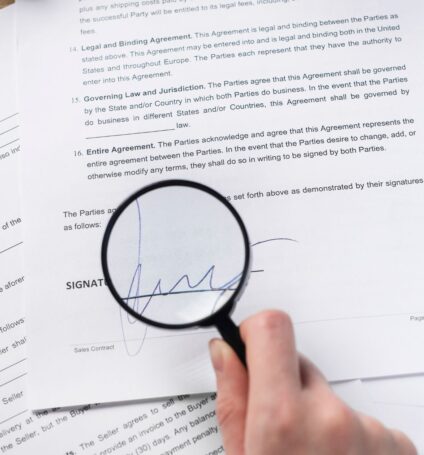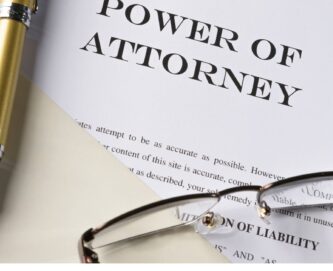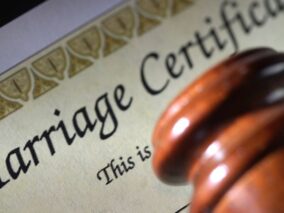What is an attestation?
An attestation involves certifying the validity of a document and the signatures on it. The party attesting to the truthfulness of the document's agreement should be an uninterested third party to prevent a conflict of interest.
What Is Document Attestation?
Document attestation is the process of verifying the authenticity and validity of documents by an authorized authority or service. It involves confirming the genuineness of the document and the signatures or seals it contains.
What Is an Attested Document?
An attested document is one that has successfully undergone the attestation process. This means that a competent authority, such as a notary public or a document attestation service, has reviewed it, verified its contents, and added their own seal or signature to certify its authenticity.
Document Attestation Service:
A document attestation service is a specialized agency or organization that offers assistance with the attestation of documents. They guide individuals or businesses through the often complex process of getting documents authenticated for legal, official, or international purposes, such as for use in foreign countries or for legal transactions.


Can a notary offer document attestation service?
Yes, a notary public can offer document attestation services, but it's essential to clarify the terminology and distinctions involved. In some jurisdictions, "document attestation" may refer to a broader process of authenticating or certifying documents for various purposes, including international use. In such cases, a notary public can play a role in the attestation process.
Here's how a notary public can provide attestation services:
Notarization:
The primary service provided by a notary public is notarization. This involves verifying the authenticity of documents, confirming the identities of signatories, and certifying the document's legitimacy by adding their official seal and signature. Notarization is a form of document attestation in itself, as it adds credibility and legal weight to documents.
Certified Copies:
Notaries public can also provide certified copies of original documents, which is a form of document attestation. They certify that the copy is a true and accurate reproduction of the original, making it legally acceptable as a duplicate.
Acknowledgment and Jurat:
Two common notarial acts, "acknowledgment" and "jurat," involve document attestation:
Acknowledgment:
In an acknowledgment, the notary attests that the signer has voluntarily and knowingly executed the document. This is often used for deeds, contracts, and legal agreements.
Jurat:
In a jurat, the notary attests that the signer has sworn to or affirmed the truth of the contents of the document under oath. This is commonly used for affidavits and sworn statements.
International Use:
In some cases, documents may need to be notarized by a notary public for international use. This can be part of the attestation process required for documents like power of attorney, educational certificates, or business agreements intended for use abroad. Notaries may be required to follow specific procedures to meet the requirements of foreign authorities.
It's important to note that the terminology and specific requirements for document attestation can vary by jurisdiction, and the extent of a notary public's involvement in the broader attestation process may differ.
For certain international uses, you may also need to work with specialized agencies or consulates for further authentication of your documents.

What is an Attested Copy?
In some cases, an attested document may also be referred to as an attested copy. This term typically applies to situations where a copy of an original document has been attested or certified by an authorized authority to be a true and accurate reproduction of the original.
Document attestation is essential for various purposes, including legal transactions, international travel, immigration, educational qualifications, and more. The attestation process helps ensure that documents are genuine, preventing fraud and ensuring their acceptance and recognition in various official or foreign jurisdictions.
Is attestation of a document the same with notary attestation?
No, "attestation of a document" and "notary attestation" are not the same, although they share some similarities. They are two distinct processes with different purposes and often involve different authorities. Here's an explanation of each:
Attestation of a Document:
Attestation of a document is a broader term that can refer to the process of verifying the authenticity and validity of documents through a variety of methods.
It is not limited to notaries public and can involve different authorities or organizations depending on the context and the requirements of the document.
Attestation can include processes such as document certification, verification by government departments, and authentication for international use.
Notary Attestation (Notarization):
Notary attestation, often simply called "notarization," specifically refers to the process performed by a notary public.
A notary public is a government-appointed official authorized to perform notarial acts, which include verifying signatures, confirming identities, and certifying the authenticity of documents.
Notary attestation involves a notary acting as a neutral and impartial witness to the signing of a document, ensuring that it meets legal requirements, and adding their official seal and signature to certify its authenticity.
While both "attestation of a document" and "notary attestation" involve verifying the authenticity of documents, "notary attestation" is a specific subset of the broader attestation process, carried out by notaries public. The main difference lies in the authority performing the attestation and the specific processes involved. The choice between these methods depends on the legal and practical requirements of the document in question.
How is a document attested
Document attestation is a multi-step process that involves verifying the authenticity and legality of it.
Notarization (Initial Step): The first and fundamental step is notarization. This process involves visiting a certified notary. Here's what happens during notarization:
You bring the document to be notarized.
We will verify your identity by asking for a government-issued ID, such as a driver's license or passport.
After confirming your identity and reviewing it to ensure it's complete and accurate, We will place the official notary seal or stamp on it. This seal is a symbol of the document's authenticity.
State-Level Attestation (If Required): Depending on the type of document and its intended use, you may need to go through state-level attestation. This typically involves submitting it to the relevant state government authority, such as the Home Department or the State Secretary. They will review and authenticate it, adding their seal or stamp to it.
Central-Level Attestation (If Required): Some documents may require further attestation at the central government level. This involves sending your document to the Ministry of External Affairs (MEA) in your country. The MEA will review the state-level attestation and, if everything is in order, place their seal on it.
Embassy or Consulate Attestation (If Required): If you plan to use your documents in a foreign country, you may need to get them attested at the embassy or consulate of that specific country. The embassy or consulate will follow its own procedures to authenticate the document for use in their jurisdiction.
Final Verification: After completing all the necessary steps, your document is considered fully attested and legally valid. You can then confidently use it for your intended purposes, whether it's for education, employment, immigration, or any other official matters.
It's essential to understand that the specific attestation requirements can vary depending on the type of document and the country in which you plan to use it. Different countries have their own regulations and processes for document attestation.


As a notary, how do you attest a document?
Attesting a document involves a series of steps to verify its authenticity and legality. As a notary, the main role in this process is to provide notarization, which is the first and crucial step. Here's how it works:
Review the Document: First, we carefully review the document you want to attest. It's essential to ensure that all the information is complete and accurate.
Verify Signatures: We will verify the signatures on it. This includes confirming the identity of the individuals who have signed the document. Typically, you'll need to provide valid identification to establish your identity.
Place the Official Seal or Stamp: Once we 've verified the document and the signatures, We will then place the official notary seal or stamp on it. This seal is a mark of authenticity and credibility, indicating that the document has been notarized by a certified notary public.
Complete the Notarial Certificate: We will also complete a notarial certificate that includes details about the document, the date of notarization, and other relevant information. This certificate serves as an official record of the notarization.
Maintain a Notary Journal: In many jurisdictions, notaries are required to maintain a notary journal, which is a record of all notarial acts performed. This journal helps ensure transparency and accountability in the notarization process.
Administer an Oath or Affirmation (if required): Depending on the nature of the document, we may need to administer an oath or affirmation to the signatories, confirming that the information is true and accurate.
It's important to note that while notarization is a crucial step, some documents may require additional levels of attestation, such as state-level, central-level, or embassy/consulate attestation. These additional steps ensure that the document is legally recognized in various contexts, especially when it needs to be used internationally or for specific legal purposes.


Who can do attestation of documents?
Attestation of documents typically involves the verification and authentication of the authenticity and legality of a document by authorized individuals or authorities. The specific individuals or entities who can perform attestations may vary depending on the country and the documents type. Here are some common parties involved in the process:
Notary Public: Notaries public are authorized to perform notarization, which is often the initial step in the attestation process. They verify the identity of individuals signing and place their official seal or stamp on the document, confirming its authenticity.
State Government Authorities: Some documents may require attestation at the state government level. This can include departments such as the Home Department or the State Secretary, depending on the country. They authenticate documents by adding their seal or stamp.
Central Government Authorities: For certain documents, central government authorities may be involved in the attestation process. In many countries, this typically involves the Ministry of External Affairs (MEA) or a similar central agency responsible for international affairs.
Embassies or Consulates: If you intend to use your documents in a foreign country, the embassy or consulate of that country often performs attestation. They have specific procedures for authenticating documents for use within their jurisdiction.
Educational Institutions: In the case of academic certificates and transcripts, educational institutions may attest documents to verify their authenticity. This is common when applying for education abroad.
Employers and HR Departments: Some employers may require attestation of documents, such as employment certificates or experience letters, to verify the qualifications and work history of employees.
Legal Professionals: Attorneys or legal professionals may be involved in the attestation of legal documents, contracts, or affidavits to ensure their legal validity.
Medical Authorities: In certain cases, medical authorities may be responsible for attesting medical certificates or health-related documents.
Public Officials: Public officials, such as judges, magistrates, or commissioners of oaths, may be authorized to attest specific documents, particularly legal affidavits and oaths.
It's important to note that the requirements for document attestation can vary widely depending on the type of it, its intended use, and the country in which it will be used. Therefore, it's essential to research and follow the specific requirements relevant to your situation and consult with the appropriate authorities or professionals when necessary.
Why is attestation required?
Attestation is required for several important reasons, and its necessity can vary depending on the specific document and its intended use:
Authentication and Verification: Attestation serves as a crucial means of authenticating the origin and legitimacy of documents. It helps verify that a document is genuine, accurate, and has not been tampered with, especially when the document is to be used in official or international contexts.
Cross-Border Recognition: In the increasingly globalized world, documents often need to be recognized and accepted in foreign countries. Attestation ensures that a document holds legal validity and credibility in the destination country. For example, when applying for a job or pursuing education abroad, foreign authorities may require attested documents to ensure their authenticity.
Compliance with Legal Requirements: Many countries have specific legal requirements for certain documents to be considered legally valid. Attestation is often necessary to demonstrate that these requirements have been met. For example, legal contracts, affidavits, and property deeds may need attestation to be enforceable.
Preventing Fraud and Forgery: Attestation helps deter fraudulent activities and document forgery. The verification process ensures that the document's content matches the original, and it confirms the identity of the individuals involved in the document's creation or signing.
Educational and Professional Qualifications: Attestation is often required for educational certificates, diplomas, and transcripts when applying for admission to educational institutions or for employment. It ensures that academic qualifications are genuine, which is essential for maintaining the integrity of educational systems and professional qualifications.
International Trade and Commerce: In international business transactions, attestation of commercial documents, such as invoices, contracts, and certificates of origin, is often mandatory. It helps establish trust and transparency in trade relations between different countries.
Legal Proceedings: For legal documents and affidavits, attestation is often required to ensure their admissibility in court. It adds credibility to the statements made in these documents.
Consular Services: Foreign embassies and consulates may require attestation for various documents, including visa applications, immigration-related paperwork, and residency permits. Attestation is necessary to verify their authenticity for immigration and travel purposes.
In summary, attestation is required to establish the authenticity and legality of documents, ensuring their acceptance in a variety of official and international contexts. It helps prevent fraud, maintains the integrity of legal and educational systems, and facilitates cross-border recognition of documents, making it an essential process for a wide range of purposes.
What Documents need attestation?
These documents can vary depending on the specific purpose and the country in which they will be used. While the list is not exhaustive, here are some common types:
Educational Documents:
Diplomas and Degrees:
Academic certificates, diplomas, and degrees often require attestation for admission to foreign universities or for employment abroad.
Transcripts:
Academic transcripts, especially for higher education, may need attestation for recognition by foreign educational institutions.
Personal Identification Documents:
Passports and Visas:
Some countries may require attested copies of passports and visas for immigration and travel-related purposes.
Birth Certificates:
Attestation of birth certificates may be necessary for various reasons, including immigration applications.
Legal Documents:
Marriage Certificates:
Attestation of marriage certificates is often needed for spouse visa applications, among other purposes.
Divorce Decrees:
Divorce papers may require attestation when establishing marital status in foreign countries.
Wills and Testaments:
For international probate or inheritance matters, wills and testaments may need attestation.
Powers of Attorney:
Attested powers of attorney are often required for legal representation in foreign countries or for property transactions.
Commercial Documents
Commercial Contracts:
Business contracts and agreements may require attestation for international trade and commerce.
Invoices and Bills of Lading:
Commercial documents used in import-export transactions may need to be attested for customs and trade purposes.
Property Documents:
Property Deeds:
Deeds and property-related papers often need attestation for property transactions and land ownership verification.
Affidavits and Declarations:
Affidavits:
Sworn statements and affidavits may require attestation for legal proceedings or visa applications.
Statutory Declarations:
Similar to affidavits, statutory declarations may need attestation for various legal purposes.
Medical and Health-Related Documents:
Medical Certificates:
Medical certificates may require attestation for health insurance claims, medical treatment abroad, or immigration purposes.
Employment and Experience Certificates:
Employment Certificates:
Letters of employment and experience certificates may need attestation for job applications and work visas.
Financial Documents:
Bank Statements:
For visa applications and financial transactions, bank statements may require attestation to prove financial stability.
Power of Attorney:
If you authorize someone to act on your behalf, a power of attorney document may need attestation for legal recognition.






It's essential to note that the specific documents and the requirements can vary by country and the purpose for which the these will be used. Always check with the relevant authorities, institutions, or embassies to determine the exact requirements for your specific situation.
What documents can be attested by a notary in the state of Georgia?
"A Georgia notary public has the authority to make a certified copy of a document provided the document presented for copying is an original document and is neither a public record nor a publicly recorded document.
Documents which can be copied and certified by a Georgia notary public include: business transactions, school diplomas, personal letters, a social security card, insurance policies, accounting statements, contracts, lease agreements, invoices or bills of sale, student permission forms, consent to give medical treatment forms, living wills, and consent to travel forms."
A Georgia notary public is prohibited from making certified copies of publicly recordable documents which include: deeds, mortgages, and other instruments dealing with real estate, vital records, birth certificates, marriage records, divorce decrees, powers of attorney, probated wills, student records or transcripts from public schools, colleges or universities, military discharges, Uniform Commercial Code documents, court pleadings, documents marked “filed” or “recorded”, most documents retained by a government office, Certificates of Naturalization, Certificates of Citizenship, Declarations of Intention to Become a Citizen, foreign passports.
In the state of Georgia, a notary can typically attest or certify the following types of documents:
Personal Identification Documents:
Notarization of copies of identification documents, such as passports and driver's licenses, to confirm their authenticity.
Georgia allows copy certification of a U.S. passport but requires the passport holder to provide an affidavit read more here
Legal Documents:
Notarization of affidavits and statutory declarations, including verifying the identity of the affiant and witnessing their signature.
Notarization of powers of attorney documents, confirming the identity of the person granting power and witnessing their signature.
Commercial Documents:
Notarization of contracts and agreements, often for legal and business purposes.
Property Documents:
In some cases, notaries may be involved in property transactions, including notarizing signatures on property deeds and related documents.
Medical and Health-Related Documents:
Notarization of medical authorizations or consent forms, especially when it involves confirming the identity of the person providing consent.
Employment and Experience Certificates:
Notarization of employment verification letters or experience certificates to confirm the authenticity of the document.
Financial Documents:
Notarization of copies of bank statements, typically for immigration or visa purposes.
Educational Documents:
Notarization of copies of educational documents, such as diplomas and degrees, may be performed for various purposes, including visa applications and education abroad.
"Georgia prohibits copy certification for publicly recordable documents, such as divorce decrees and university transcripts."
--The State of Georgia specifically allows for copy certification of school diplomas, while it forbids the making of notary certified copies of school records and transcripts from a public school, college, or university.
Personal Declarations:
Notarization of personal statements or declarations, often used in legal or administrative matters.
Please note that while these types of documents can generally be notarized in Georgia, the specific requirements and processes may vary based on the document and its intended use. It's advisable to consult with an attorney in Georgia for guidance on notarization requirements and to ensure compliance with local laws and regulations. Additionally, some documents may require additional levels of attestation beyond notarization, depending on their intended use and destination.


Does attestation require signature?
Yes, attestation of a document typically involves the placement of a signature or a certification mark by the authorized attesting authority. This signature or mark serves as a confirmation by the authority that they have verified the document's authenticity, legality, or accuracy, depending on the specific purpose of the attestation.
Attestation is the process of certifying the accuracy or authenticity of something, often by bearing witness.
In legal contexts, attestation refers specifically to witnesses formally certifying documents through signature. Before important documents like wills, deeds, and powers of attorney can be legally executed, they require attestation.
To attest a document, a witness formally certifies in writing that they were present and observed the signing process. The attesting witness swears or affirms the signer's identity was verified and that they signed voluntarily. Serving as an attesting witness requires being of legal age and sound mind.
By providing signature verification, attestation establishes authenticity and validity of documents. It adds a layer of third-party certification that the document signing was conducted properly. This helps prevent fraud and disputes through witness testimony.
For example, when notaries, attest a document, they review it to ensure it complies with applicable laws and regulations. Once they are satisfied that the document meets the required standards, affix their signature, seal, or stamp to the document. This signifies that the document has gone through the attestation process and is now considered legally valid and acceptable for its intended use
The presence of the attestation signature or certification mark adds credibility and authority to the document, making it suitable for various official and international contexts. It helps establish the document's authenticity and can be crucial when presenting the attested document for legal, administrative, or cross-border purposes.
The specific format and appearance of the signature or certification mark may vary depending on local laws and regulations, the type of document, and the authority performing the attestation. It's essential to ensure that the attestation signature or mark is clear and complies with the requirements of the relevant authorities to ensure the document's acceptance and validity
There are several key requirements for properly attesting a document through witness signatures:
Proper attestation involves witnesses being present to verify identities, observe the signing, sign afterwards, and identify themselves - all requirements that help prevent fraud.
When performed correctly, attestation by impartial witnesses is an essential safeguard that adds legal weight and validity to important documents.


What does it mean to attest a signature?
Attesting a signature is a formal process in which a notary public or an authorized individual verifies and confirms the authenticity of a person's signature on a document. It involves several important steps to ensure the integrity and credibility of the signature.
First, the signer is required to present valid identification to establish their identity. Then, during the signing of the document, the notary must be physically present to observe the process. My role is to confirm that the signature is made voluntarily and without any form of coercion or duress.
Once I am satisfied that the signature is genuine and matches the name of the signer, I affix my official seal or stamp to the document. This seal contains information about my identity, including my name and commission expiration date. Additionally, I may attach a notary certificate to the document, which serves as a formal statement of the attestation process and the confirmation of the signature's authenticity.
In essence, attesting a signature provides an additional layer of credibility to the document, making it more reliable and acceptable for various legal and official purposes. It ensures that the signature can be trusted and relied upon in legal transactions, contracts, affidavits, and other important documents.
The attestation process is typically performed by authorized individuals, such as notaries public or government officials, who confirm the authenticity, legality, or validity of documents or signatures. This confirmation is often done by witnessing the signing of the document, verifying the signer's identity, and affixing an official seal or stamp to the document.
The key point is that attestation is a distinct process from notarization. Notarization is a specific form of attestation performed by notaries public, who have legal authority to perform certain notarial acts. When a notary public notarizes a document or signature, they follow the procedures outlined by state or country laws and regulations.
In some cases, the attestation process may include notarization as part of its requirements. For example, when documents need to be used in international contexts, they may require both notarization and further attestation by government authorities or embassies. This combination ensures that the document is legally recognized and accepted in various jurisdictions.
It's important to understand that the specific requirements for attestation, including whether notarization is needed, can vary depending on the document's purpose, jurisdiction, and the laws of the relevant authority or country. Therefore, it's advisable to consult with the appropriate authorities or professionals to determine the exact attestation requirements for your specific situation.
Do attestation need to be notarized?
Attestation itself does not necessarily need to be notarized!
Disclaimer:
We are not licensed attorneys in the State of Georgia, and we may not give legal advice or accept fees for legal advice. If you need assistance in deciding whether documents are appropriate for notarization, please contact a licensed attorney to determine applicability. Furthermore, you assume all responsibility for the accuracy of the information provided and must check the accuracy of information
Contact Us
Hours:
Monday - Saturday 7am- 10pm
Only by appointment
E-mail:
contact@inktrail.net
Call:
© All Copyrights 2023 by InkTrail

